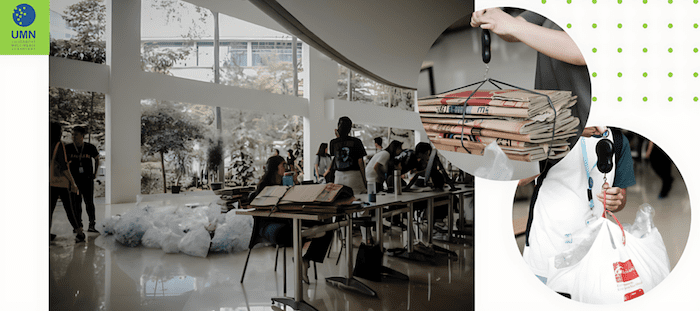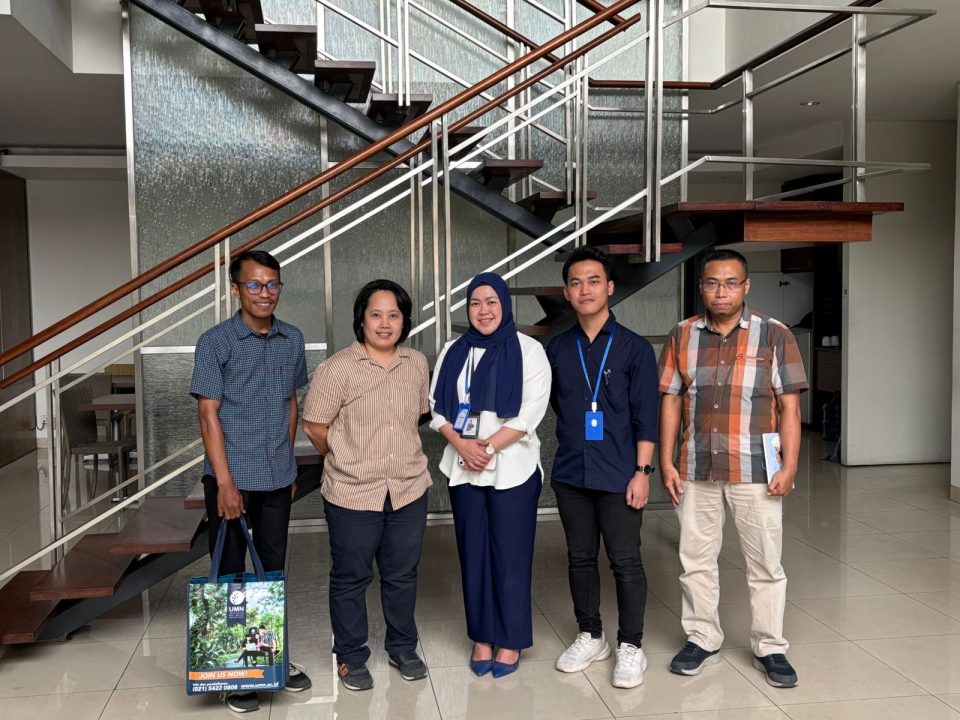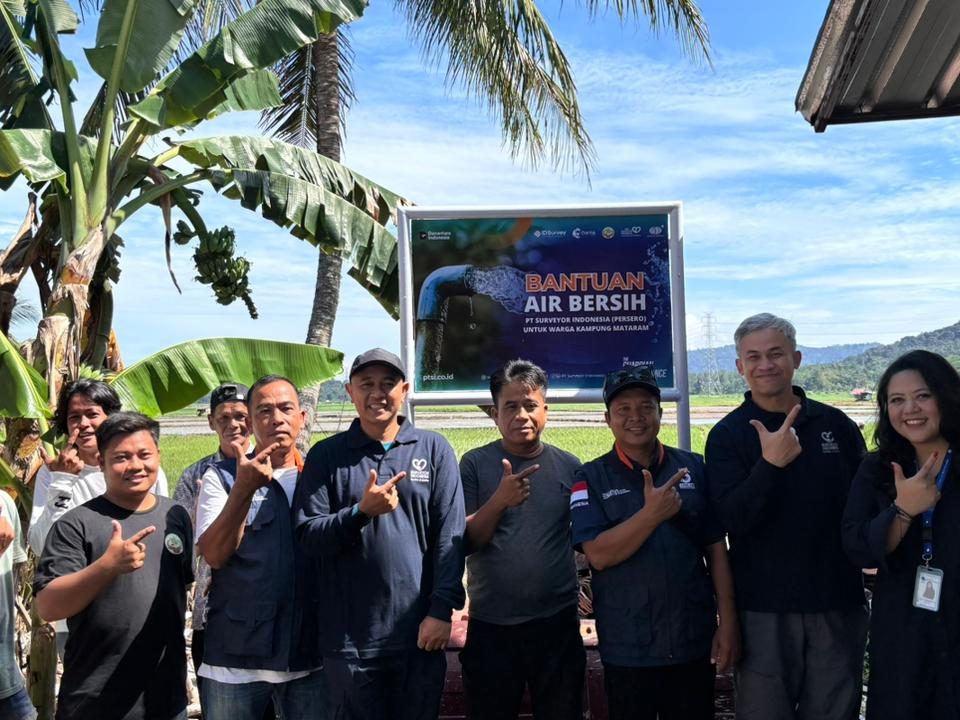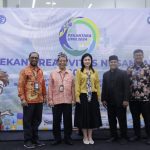
UMN Archipelago Creativity Week 2024
December 14, 2024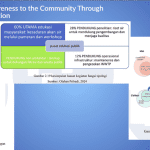
Reimagining Pluit, Jakarta: UMN Designs a Regenerative Water Education Hub for the Community
December 15, 2024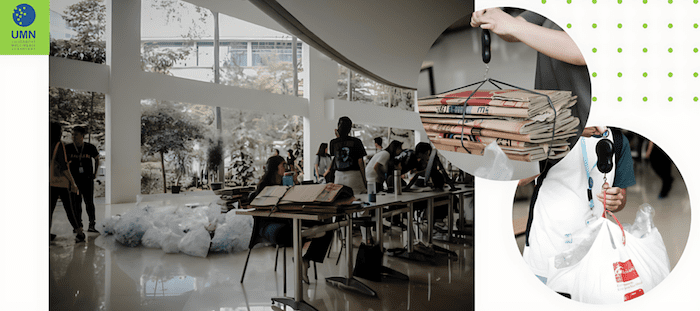
Recycle waste collection at UMN (Documentation by UMN ECO)
UMN actively manages the waste generated daily to ensure we do not contribute to environmental pollution. This waste governance is supported by various core policies, such as the Ethical Sourcing Policy for food and supplies, the Policy to Minimize Plastic Use and Disposable Items, and the Waste Disposal Policy (covering hazardous materials and final disposal). The reach of these policies extends beyond the UMN Academic Community, also involving outsourced services, supply chains and suppliers to achieve maximum environmental impact. Waste at UMN is classified into three primary categories: Organic, Inorganic, and Hazardous.
A. Organic Waste Management: A Sustainable Closed Loop
UMN implements a closed-loop organic waste management system, ensuring 100% of our organic waste is recycled to support a green and sustainable campus ecosystem.
Recycling Through Composting
Plant-based organic waste, such as fallen leaves and plant trimmings collected across the campus grounds, is processed entirely within our dedicated composting area. The resulting compost is then reused as natural fertilizer to nourish the green spaces across campus, effectively closing the waste-to-nutrient cycle.
Food Waste Innovation
Beyond composting, UMN also manages food waste from the campus canteen, such as fruit peels and leftover scraps, using eight eco-enzyme units. These units convert food waste into eco-friendly cleaning and gardening solutions. The eco-enzyme is harvested every three months, serving as a sustainable practice that significantly reduces the volume of food waste sent to landfills.
Data and Achievements
Our commitment is validated by measurable results. Throughout 2024 alone, UMN successfully processed 4.200 Kg of organic waste. This figure effectively treated over 72,41% of the total 5.800 Kg of organic waste generated.

UMN’s Organic Waste Produced vs. Treated Throughout 2024
B. Inorganic Waste: Recycling Through Strategic Partnerships
Inorganic waste, which includes materials like plastics, metals, glass, and other non-biodegradable items, represents the largest fraction of waste generated at UMN. To effectively manage this significant environmental footprint, UMN collaborates with specialized third-party organizations for recycling and proper disposal. This strategic partnership is vital in advancing our waste management goals and promoting a greener campus.
Plastic Recycling: The Plasticpay Partnership
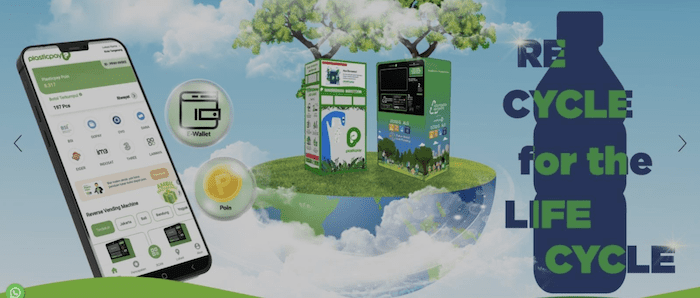
(Source: https://plasticpay.net/ )
For plastic bottles, UMN has established a crucial partnership with Plasticpay—a social movement utilizing a digital platform to transform plastic waste into valuable products.
- Process and Product: Collected plastic waste is processed into high-quality raw materials, specifically granules, Recycled Polyester Staple Fiber (Re-PSF), yarn, and fabric. These eco-friendly materials are then used in various products, including pillows, carpets, furniture, and textile items.
- Logistics and Incentive: Plasticpay conducts weekly collections from UMN. In addition, the initiative provides a social incentive, as each collected bottle earns Plasticpay points that can be exchanged for cash. Click Here for MoU with Plasticpay.
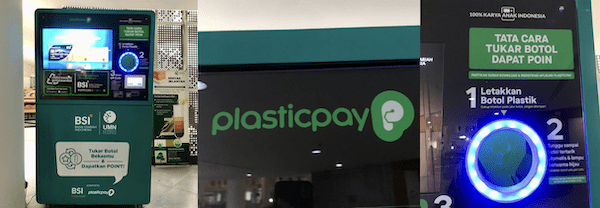
PlasticPay bottle collection machine at UMN (Doc. UMN)
Data on Plastic Recycling: On average, UMN manages approximately 12.446 Kg of inorganic waste per month through this program, resulting in a total of around 317 Kg of plastic recycled per year (data from 2024).
Paper and Other Recyclables: The Rapel and Indoarsip Collaborations
In addition to plastic, paper waste—such as used printouts and cardboard—constitutes another significant portion of our inorganic output. To address this, we are partnering with two key organizations for responsible processing.
General Recyclable Collection with Rapel
We are collaborating with Rapel, a sustainable waste management platform operated by PT. Wahana Anugerah Energi.
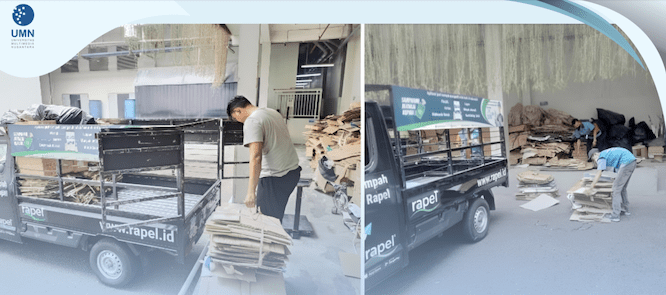
Recycled paper was collected and handed over to Rapel (Doc. UMN)
Service: Rapel provides reliable collection services for various recyclable materials, ensuring that general paper waste and other eligible non-biodegradable materials are processed responsibly and successfully diverted from landfills. This reinforces UMN’s overall commitment to sustainable waste practices.
Data on Paper Recycling: In 2024, UMN collected approximately 986 kg of paper waste each month managed through the Rapel partnership, accumulating to about 11.835kg of paper waste per year.
Secure Paper Waste Recycling with PT. Indoarsip
For paper waste that contains sensitive or private information, we are also working with PT. Indoarsip.
Service: PT. Indoarsip specializes in the secure destruction and recycling of confidential wastepaper. This collaboration ensures that all private documents are shredded and handled with strict confidentiality before the material is processed and recycled back into new paper products. This dual-pronged approach guarantees both environmental sustainability and data security.
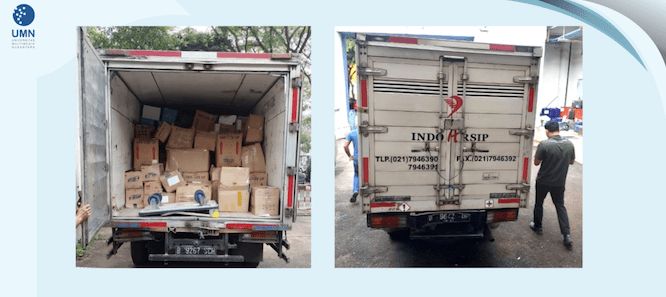
Recycled paper collected as part of UMN’s campus sustainability efforts (Doc. UMN)
C. Hazardous Waste Management: Compliance and Certified Disposal
UMN ensures rigorous control over hazardous waste (B3 waste) to prevent environmental contamination and uphold our commitment to sustainable practices.
Standardized Procedures
Our hazardous waste management process is strictly governed by the [SOP SKL-02/PKL 01/SOP-09], which provides comprehensive guidelines for every stage: sorting, storing, processing, and disposal. This Standard Operating Procedure (SOP) is designed to minimize contamination risks and facilitate responsible handling, prioritizing recycling whenever feasible. The process begins with identifying waste types, followed by careful sorting, handling, and storage according to specific safety protocols until the final disposal stage.
Certified Third-Party Partnership
To guarantee the highest level of responsible disposal, all hazardous waste, including regulated B3 materials, is managed exclusively in partnership with certified third-party providers. Specifically, the disposal of B3 waste is handled through an MoU with PT Adhika Makmur Persada, ensuring that UMN’s hazardous materials are processed and treated in full compliance with stringent environmental standards.
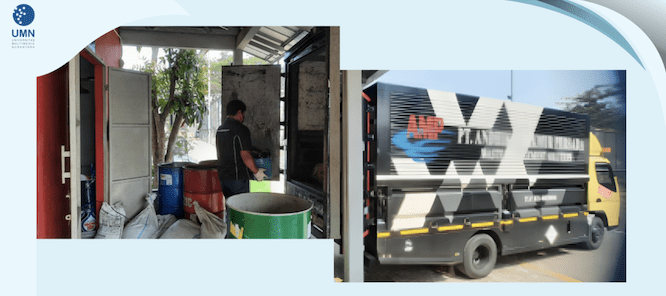
Certified partner collecting hazardous (B3) waste in compliance with environmental standards (Doc. UMN)
Management of Used Cooking Oil
Similar to B3 waste, used cooking oil (UCO) requires careful management to prevent it from contaminating water channels and polluting the environment. To ensure responsible disposal by specialists, UMN partners with PT. Sumber Surya Kalvari to process UCO. This collaboration protects natural resources and aligns with our sustainable waste practices.

Collected used cooking oil ready for safe and certified processing (Doc. UMN)
Certified Partnership and Compliance
All certified vendors responsible for managing our hazardous (B3) waste, including the disposal of UCO, hold the necessary permits to handle these materials responsibly. Their qualifications ensure strict compliance with safety and environmental standards. Details of their certifications and permits can be found here.
Accountability and Reporting
For all hazardous materials, UMN generates an official hazardous waste manifest, which is formally reported to government authorities. This documentation emphasizes our accountability and transparency in safe waste management.
Please refer to the table below to see the volume of Hazardous Waste (B3 Waste) items recycled throughout 2024:
| Type of Harmful Waste | Weight (Kg) |
| Expired Pharmaceutical Products | 2,2 |
| Liquid Waste | 22,8 |
| Air Filter | 36 |
| Used B3 Packaging | 85,4 |
| Used Ink Packaging | 134,2 |
| Used Batteries/Accumulators | 155 |
| Glass Waste | 176,8 |
| Lamps | 185,2 |
| Electronic Waste | 314,4 |
| Used Rags | 346,6 |
| Total | 1458,6 |
In summary, UMN conscientiously disposed of 1458,6 kg of hazardous (B3) waste in 2024, thanks to the support of our dedicated and certified partners. Through proper handling, documentation, and disposal in compliance with environmental standards, we strive to contribute to a cleaner and healthier environment for future generations. Our commitment to sustainable practices reflects UMN’s broader dedication to protecting the planet for all.

